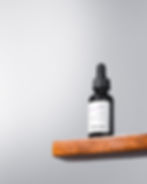Why should you avoid using retinol before a permanent makeup treatment?
- Rachael Tsang
- Jun 10, 2024
- 3 min read

As a permanent makeup artist, it is important for me to let you know what to avoid in the lead up to your permanent makeup appointment to ensure the best results. One crucial aspect that clients need to be aware of is the importance of avoiding certain skincare products, particularly retinol, before undergoing a permanent makeup procedure. Let’s go into why this is essential and how it can impact your results.
Understanding Permanent Makeup
Permanent makeup, also known as micropigmentation, is a cosmetic procedure that involves implanting pigment into the skin to enhance features such as eyebrows, lips, and eyeliner. While the term "permanent" might be used, the colour generally fades over time. The goal is to create a natural and polished look that enhances your features with minimal daily maintenance.
The Role of Retinol in Skincare
Retinol, a derivative of vitamin A, is a powerhouse ingredient in many skincare routines. Known for its anti-aging properties, it promotes cell turnover, reduces wrinkles, and improves skin texture. While retinol can work wonders for your skin, it’s not suitable to use right before a permanent makeup session.
Why You Should Avoid Retinol Before Permanent Makeup
Increased Sensitivity: Retinol increases the skin’s sensitivity by accelerating cell turnover. This means that your skin is more delicate and more susceptible to irritation. Undergoing a permanent makeup procedure with sensitive skin can lead to discomfort and potential complications during and after the treatment.
Risk of Adverse Reactions: Sensitive skin is more prone to adverse reactions, including redness, swelling, and inflammation. When you combine retinol-treated skin with the tools used in permanent makeup, the risk of experiencing these issues significantly increases.
Impact on Healing: Healthy, intact skin is crucial for optimal healing post-procedure. Retinol can thin the skin over time, which may delay the healing process and increase the likelihood of infection or other complications. Ensuring your skin is in its best condition helps promote faster and more effective healing.
Pigment Retention: The use of retinol can affect how well the pigment adheres to the skin. Retinol’s exfoliating properties mean that the outer layer of skin is constantly renewing, which could cause the pigment to fade faster or not take as well, leading to uneven or disappointing results.
How Long Before Treatment Should You Stop Using Retinol?
To minimise risks and ensure the best possible outcome, it’s generally recommended to stop using retinol at least one week before your permanent makeup appointment. This gives your skin ample time to recover and return to a more balanced state. However, it’s always best to consult with your permanent makeup artist for personalised advice, especially if you have been using retinol long-term or at a high concentration.
Alternative Preparations for Your Skin
While you’re avoiding retinol, focus on other ways to prepare your skin for the treatment:
Hydrate: Keeping your skin well-hydrated helps in achieving better results. Use a gentle moisturiser to maintain skin hydration.
Sun Protection: Avoid direct sun exposure and wear sunscreen to protect your skin from UV damage, which can increase sensitivity.
Gentle Skincare: Stick to mild, non-irritating skincare products. Avoid any harsh exfoliants or active ingredients that might cause irritation.
Final Thoughts
Preparation is key to achieving the best results from your permanent makeup procedure. By avoiding retinol and other potentially irritating products, you can ensure your skin is in optimal condition for the treatment. Always communicate openly with your permanent makeup artist about your skincare routine and any concerns you may have. This collaboration will help you achieve the beautiful, long-lasting results you desire.
Feel free to reach out to me with any questions or to schedule a consultation. Your journey to enhanced beauty begins with the right preparation!
Book a free consultation at our permanent makeup clinic in Tunbridge Wells, Kent.
